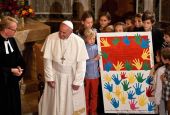We're undergoing a website migration. Please pardon any intermittent outages.
Lutherans and Catholics chart path to unity
Viewpoint: Catholics and Lutherans have made more progress in the last 50 years toward healing the wounds of our divisions than we have in the last five centuries.
Kasper's book: Mercy has been 'criminally neglected,' which is 'catastrophic'
Book review: Cardinal Walter Kasper's most recent book sets aside as inadequate the mercy-justice divide because there is a breadth to God's justice that encompasses mercy.
Unity is a Gospel imperative
VIEWPOINT
Mainstream Christianity is aging and shrinking. The institutional church is losing much of its impact on society. Divisions in many churches on ethical, social and pastoral issues are creating confusion and estrangement. The ecumenical landscape is undergoing rapid and radical change.
In times of transition, it’s wise to stay close to a fundamental ecumenical conviction: Unity belongs to the nature of the church.
The Rev. Michael Kinnamon, outgoing general secretary of the U.S. National Council of Churches, has stressed the need for a common grammar based upon an ecumenical indicative and imperative. The indicative is that since it is God who assembles the one church, unity is not something we have to create. It is a present reality given by God to the church and is presupposed in every effort for unity. The ecumenical imperative is that Christians must give expression to the essential unity of the church. It must be lived and be made visible.
Catholic and Orthodox Unity: Close Enough to Imagine
COMMENTARY
As we celebrate another Week of Prayer for Christianity, what is there to fuel our hope that this isn’t all just an exercise in futility? What’s to celebrate?
Signals are there that this movement called “ecumenical” does in fact move, that reflection as we go along on an increasing degree of “life together” is shaping our perception of the future in positive ways.
Advertisement
Advertisement
Advertisement
Advertisement
Advertisement
Advertisement
Advertisement
Advertisement

